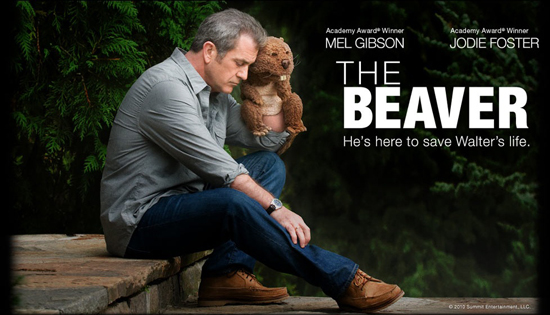I know people who have actually told me they get upset at the smallest things because nothing really bad has ever happened to them. They have a good American life; no wants, no needs, no lack of support, no lack of friends, and no sense of empathy. The Beaver is not for them.
“There is this black spot inside of me,” Walter Black (Mel Gibson) concedes. The Beaver points the spotlight on that spot in all who deal with depression. Each character, so well played by exceptional actors, has that place of emptiness, deep sadness, where the depth of inexpressible pain exists. We are drawn in to a story that represents so much of what we feel and what we see in others around us. Walter Black is depressed. He has slept-walked through life for two years. His wife (Jodie Foster) loves him regardless while struggling to maintain an existence with some semblance of family. She expresses what everyone who has ever lived with someone else’s depression has felt—commitment to pain. Pain is a character which is not listed in the cast list but appears in every scene. Pain inserts its various shades of color across each personal palette.
Tagging, illegal spray painting on public buildings, represents the bold, bright colors of emotion in The Beaver. People who cannot express themselves personally find their words in paint or in the words drafted for them by Walter’s son Porter (Anton Yelchin, Charlie Bartlett). The screenwriter Kyle Killen allows both paint and Porter’s words to speak for Meredith (Tracey Lawrence, well known for her role in Winter’s Bone). Killen’s sensitive, spry script walks the fine line of anguished hilarity. Movies about mental illness can either feel like Freddy Krueger’s Nightmare or Pee Wee’s Playhouse: you know both exist and you’re pleased not to know either. The Beaver is the perfect place to find the nuanced high-wire act necessary to span the space between patient and caregiver. [I would highly recommend the film for group discussion though it might not be a bad idea to have a psychologist standing by.] Mel Gibson’s performance is exquisite. For all of Gibson’s off-screen imbroglios it is the entanglement of his own soul which is allowed full expression here. Foster’s direction of her friend, after a 16 year hiatus from behind the camera, allows the scent of hope to rise from the mess of life.
For those of us who have experienced the deserts of depression—whether personally or with others—The Beaver is for us. Exact scenes and specific lines will crowd your mind for days after you watch. “You’re not alone in this” is what we say to those who suffer. The famous bumper sticker suggesting stuff happens is short form of the long road we walk. Moreover we surely agree with the opposite of the lie “everything will be all right.” But it is a line from Ecclesiastes which exactly captures the essence of The Beaver: “What is crooked cannot be straightened.” And so we live with remnants of goodness in the landscape of pain. Some can find their way toward a sense of wellness with a hand puppet; but holding the hand of another who has experienced our pain gives us hope.
Rated PG-13 for some profanity, sexuality, and the disturbing images of mental illness.
Mark believes that care giving begins with empathy; that if you ain’t gone through _it, you don’t know _it.


You r so good at this —I can hardly wait for next Spring when u share in another way. Your insight, sensitivity and “empathy” for this character—and the film at large—draws me to it, of course—but fine tunes my thoughts to all I know of YOUR life! It has certainly not been an easy one—but how the Lord has used the hard places to give you focus and purpose for Him!!